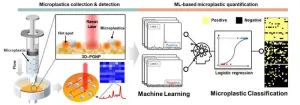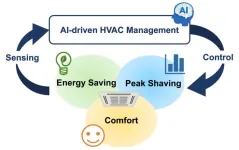The STPF Rapid Response Cohort in AI operates under the AAAS Science & Technology Policy Fellowships (STPF) program and is part of the 51st class of 276 scientists and engineers placed across all branches of the federal government who just kicked off their assignments. The AI cohort is comprised of six scientists who will serve as expert staff in a congressional office or committee with most starting their yearlong placements this week to provide guidance on pressing issues such as AI ethics, information integrity, intellectual property, human rights and algorithmic risk.
“We have been running the STPF program for half a century, and this is the first time we have been able to bring the support and a talented pool of applicants together in such a short timeframe. It took activating partners, scientific societies, industry colleagues and our networks to attract promising candidates and make this program a reality,” said Rashada Alexander, Ph.D., STPF director at AAAS. “Thanks to broad-base support, legislators can now more easily access AI-specific scientific and technical expertise as they explore policy options.”
The AI fellows were selected for their expertise and proficiency on the complexities of developing and deploying a multitude of AI technologies. They will help policymakers and their staff understand conceptually how AI works, along with the technical, economic and social issues that may arise from its widespread deployment. The AI fellows had two weeks to apply and two more weeks to wrap up their personal and professional lives — and, in most cases, move their households to Washington, D.C.
“The sudden explosion in generative AI affects every aspect of policy, from national security, workforce, and health care to intellectual property, education and transportation,” said Craig Mundie, former chief research and strategy officer for Microsoft, who conceived of this new fellowship cohort program with AAAS. “We are entering a transformational era in human history that requires informed policymakers who understand the potential implications of AI on society.”
Placements for the 2023-24 STPF Rapid Response Cohort in AI include:
U.S. Senate Committee on Banking, Housing, and Urban Affairs: Serena Booth, Ph.D., Computer Science, Massachusetts Institute of Technology. Prior positions: Visiting researcher at the University of Texas at Austin and product manager at Google. The committee scrutinizes AI, algorithms and other emerging technologies, which may be used in the banking, housing and investment fields. Office of Sen. Bill Cassidy (R-La.): Soribel Feliz, M.S., Public Administration and Economics, Syracuse University. Prior positions: Microsoft, Meta and the U.S. Department of State. Sen. Cassidy is a member of the U.S. Senate Committee on Health, Education, Labor & Pensions, which will cover AI impacts in health care, privacy, education and the workplace. Office of Sen. Martin Heinrich (D-N.M.): Cynthia Lee, Ph.D., Computer Science, University of California San Diego. Prior position: Faculty, Computer Science Department, Stanford University; has also served as an expert witness. Sen. Heinrich is co-chair of the Senate AI Caucus. Office of Sen. Mark Kelly (D-Ariz.): Kiri Wagstaff, Ph.D., Computer Science, Cornell University. Prior position: Senior Instructor I, Oregon State University, and the National Aeronautics and Space Administration. Sen. Kelly is a member of the Senate AI Caucus. Office of Sen. Mike Rounds (R-S.D.): Rebecca Voglewede, Ph.D., Neuroscience, Tulane University. Prior position: National Institute on Deafness and Other Communication Disorders, National Institutes of Health. Sen. Rounds is co-chair of the Senate AI Caucus. Office of Sen. Ron Wyden (D-Ore.): Eoghan Stafford, Ph.D., Political Science, University of California Los Angeles. Prior position: Centre for the Governance of AI (United Kingdom); researcher focused on the intersection of data science and human rights, democracy and international conflict. Sen. Wyden is focused on privacy, cybersecurity and other related issues to understand potentially abusive practices and advance national policy to prevent misuse. “I am pleased to welcome Dr. Cynthia Bailey Lee to my team as a new AAAS fellow. Cynthia brings a wealth of computer science expertise, particularly in the area of artificial intelligence. She will be an important part of my team as the Senate continues to determine how best to govern AI,” said Sen. Heinrich.
Sen. Wyden added: “Eoghan's expertise on the intersection of AI and international human rights and free speech will provide a valuable new perspective to my office's work on those pressing issues. I look forward to Eoghan joining our team and contributing to the vital conversation about how to defend those core values in the face of rapid technological advancements.”
AAAS administers the STPF program, including the new AI cohort, and provides professional development throughout a fellow’s term. The selection process for STPF fellows is nonpartisan, and the fellows interview with host offices — personal offices and congressional committees — prior to making their final decisions. Of the 276 scientists and engineers in the 2023-24 STPF class, 38 are serving in Congress, one is serving at the Federal Judicial Center, and 237 are serving in the executive branch across 19 federal agencies or departments.
“These exceptional technology experts answered the call to help shape the future of AI. They will inform policy that enables the greatest AI advancements while ensuring benefits for all,” said Sudip S. Parikh, Ph.D., chief executive officer of AAAS. “As AAAS turns 175 and strives to ignite progress for the next two centuries, agile programs that provide timely expertise for urgent policy matters will be crucial — AI is just the beginning.”
AAAS received more than 130 applications for the AI cohort program from a wide range of scientists and engineers with AI-relevant expertise, who recognized the rare opportunity to serve in Congress during a pivotal time in the public policy landscape. The new AI fellowship class is sponsored by a funding consortium of foundations, corporations and individuals who recognize the need for AI technical expertise on Capitol Hill. For more information on the STPF program, visit this page.
# # #
The American Association for the Advancement of Science (AAAS) is the world’s largest general scientific society and publisher of the journal Science, as well as Science Translational Medicine; Science Signaling; a digital, open-access journal, Science Advances; Science Immunology; and Science Robotics. AAAS was founded in 1848 and includes more than 250 affiliated societies and academies of science, serving 10 million individuals. The nonprofit AAAS is open to all and fulfills its mission to “advance science and serve society” through initiatives in science policy, international programs, science education, public engagement, and more. For additional information about AAAS, visit www.aaas.org.
Founded in 1973, the AAAS Science & Technology Policy Fellowships (STPF) program provides opportunities to outstanding scientists and engineers to learn first-hand about policymaking and contribute their knowledge and analytical skills in the policy realm. As one of AAAS’ immersive fellowships, STPF aims to help ensure that public policy is made better and more complete with the consideration of scientific evidence. Fellows serve yearlong assignments in the federal government and represent a broad range of backgrounds, disciplines and career stages. Each year, STPF adds to a growing corps of approximately 4,000 policy-savvy leaders working across academia, government, nonprofits and industry to serve the nation and citizens around the world.
END




